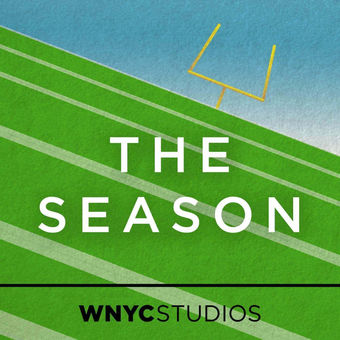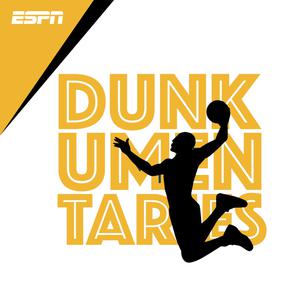
The Season
WNYC Studios
A podcast about the underdog. The Columbia University Lions have gone more than two years without a win on the football field. This fall, they are determined to end that losing streak. Their not-so-secret weapon: a new coach with one of the best records in the league. But is he the right man for the job? And are grit and strategy enough to make the Lions roar again? Every week, The Season goes onto the field to see what it really takes to make a comeback. WNYC Studios is the producer of leading podcasts including Radiolab, Death, Sex & Money, Freakonomics Radio, On the Media and many others
- 22 minutes 8 secondsEpisode 11: Year One
In their 10-game season, the Lions have seen success with wins against Wagner and Yale — the team's first victories in years — but remained a team that lost far more than it won. Yet the Lions did learn to hold their own — at least sometimes — against some of the best teams in the Ivy League. So at the end of this season, Al Bagnoli's first as coach for the team, there's just one question left to ask: Was this the turnaround everyone was hoping for?
25 November 2015, 5:00 pm - 22 minutes 9 secondsEpisode 10: And The Band Plays On
The Lions define success by wins and losses. But members of the Columbia University Marching Band — who are sometimes the only Columbia students in the stands — couldn't care less how their team actually does. (At least, that's what they'd like you to think.)
Both groups are defined by the traditions and values they pass from class to class. And that means change can only really happen one year at a time. For the football team, the best hope at a turnaround may rest not in its current team, but in the high school seniors the school is trying to recruit.
Subscribe to The Season on iTunes or wherever you get your podcasts. New episodes will be released every Thursday.
19 November 2015, 5:00 pm - 22 minutes 34 secondsEpisode 9: Moral Victory
The Columbia Lions are quick to tell you that they don't believe in "moral victories." In football, you either win or lose; there's no gray, in-between area. But it's not so simple in real life. Take the story of senior defensive lineman Chad Washington. In the spring of 2013, he was arrested and charged with a hate crime. Overnight, he became the poster child for what was wrong with football at Columbia. The charges were later dropped and since then, Washington's been working to rebuild his reputation. But turnarounds can take a long time.
12 November 2015, 5:00 pm - 26 minutes 54 secondsEpisode 8: 'The Worst Part About Our Sport'
Everybody knows football is a tough, violent sport. But the long-term consequences of playing — particularly as they relate to concussions — have only recently started to emerge. The game has gotten safer, but it still poses big risks for the young men who play it.
Football forever changed the life of Jack Kerouac, who played for the Columbia Lions in the early 1940s. It brought him to New York, where he met the likes of Allen Ginsburg and Neal Cassady and established himself as an early pioneer of the Beat movement. But, according to a New Yorker story by journalist Ian Scheffler, "Football and the Fall of Jack Kerouac," it also left him scarred — physically and perhaps even mentally.
5 November 2015, 5:00 pm - 22 minutes 14 secondsEpisode 7: Necessary Toughness
Hang around a football team long enough and you'll probably start hearing one phrase over and over again: mental toughness. Coaches, athletes, and fans alike say it's an intangible factor that separates good teams from great ones. And it turns out it's way harder to master than just about anything else in football. This week the Columbia Lions, still at the bottom of Ivy League rankings, traveled to New Hampshire to face the Dartmouth College team — their toughest opponent yet. So far this season, undefeated Dartmouth has won every game by at least three touchdowns, so the Lions will need to find that elusive mental toughness to avoid a total blowout.
29 October 2015, 4:00 pm - 22 minutes 13 secondsEpisode 6: The Bagnoli Bowl
Fresh off its first win in more than two years, the Columbia Lions go up against the University of Pennsylvania Quakers and try to prove last week wasn't just a fluke.
But Penn is where Columbia’s new coach, Al Bagnoli, confronts his own legacy. He led the Quakers to nine Ivy League championships over a 23 year career. Defeating his old team now could signal the turnaround that Columbia’s been looking for.
Subscribe to The Season on iTunes or wherever you get your podcasts. New episodes will be released every Thursday.
22 October 2015, 4:00 pm - 25 minutes 11 secondsEpisode 5: It Happened
After three weeks of steady progress — but still no win — there was a sense that Saturday's game between the Columbia Lions and the Wagner Seahawks could be the night things finally changed. And let’s not sit on the news: After two years of losing, Columbia won, beating Wagner 26-3. But the game was more than just a clash between two football teams. With the win, it might finally put to rest a conflict that pitted Columbia alums against one another and with the university at large. That multi-year battle dramatically reshaped the Lions and set the stage for what could be a new era in Columbia football history. If the team keeps on winning.
15 October 2015, 4:00 pm - 18 minutes 12 secondsEpisode 4: They’re Losing, Better
At many colleges, football players are like celebrities. Tens of thousands of fans pack the stadium — home or away, rain or shine — to root for their team.
This isn't the case at Columbia University where players are met most often with indifference, and sometimes, outright hostility.
The Lions need some fans. That means they need improve their reputation on campus. And for that to happen, they need to start winning.
8 October 2015, 4:00 pm - 17 minutes 28 secondsEpisode 3: Scrub Talk
There's an unwritten rule in Columbia football: no bragging about past glory. On a team like the Lions, it's the last thing that matters.
Plus, we hear from Bill Campbell, the former chairman of Columbia's board of trustees and onetime head coach of the Lions. A confidant of Steve Jobs and former CEO of Intuit, Campbell has been hugely successful in the business world. But he's never figured out how to make the Lions a good football team.
1 October 2015, 4:00 pm - 20 minutes 41 secondsEpisode 2: 'Where Is It Written That You Guys Can't Win?'
Fans of the Columbia Lions hadn't seen a football game like this in years. Though the team ultimately fell to the Fordham Rams 44 to 24, the Lions were in it for the first three quarters. They scored two touchdowns; one of them a first-in-a-decade return off a kickoff. But that wasn't good enough for new head coach Al Bagnoli. "I don't want our kids happy that we made this thing respectable." This loss wasn't just the first of a new season. It was the team's 22nd consecutive defeat, bringing them to something of a milestone in Columbia history: It means they're halfway to "The Streak," a time in the '80s when the Lions lost 44 games in a row. Breaking that streak made the Lions campus heroes, if only for a day. For the players who lived through it, "The Streak" was a formative experience. Going forward, the team needs to improve. Columbia president Lee Bollinger has a specific metric for this: Lions football ought to be in the running for at Ivy League championship at least once every five years. The last time Columbia won the title was in 1961.
24 September 2015, 4:00 pm - 17 minutes 43 secondsEpisode 1: The Closest Person You’re Gonna Get to a Miracle Worker
Columbia University’s football team hasn’t won a game in over two years. They've had just three winning seasons in the past five decades. Turning things around won't be easy, but this year, the university is redoubling its efforts to try.
"What we're trying to do here is no different than a company that's been bankrupt and it's been bought by somebody and they're coming in here with a new management team," said Al Bagnoli, the team's new head coach. "How do you get that business to be solvent, and how do you get it to be profitable?"
For 23 years Bagnoli had been the coach at the University of Pennsylvania, where he won nine Ivy League titles. Then he retired. And now, at the age of 62, he's come out of retirement to coach the Lions.
Columbia is pouring money and resources into the team. Players say they're more excited than they've ever been. This could be the year things finally change.
But this isn't just a story about football: It's about what it takes to turn around something that's gotten stuck, and that's hardly unique to sports.
Listen to the first episode and subscribe to The Season on iTunes, or wherever you get your podcasts. New episodes will be released every Thursday.
17 September 2015, 4:00 pm - More Episodes? Get the App
Your feedback is valuable to us. Should you encounter any bugs, glitches, lack of functionality or other problems, please email us on [email protected] or join Moon.FM Telegram Group where you can talk directly to the dev team who are happy to answer any queries.
 Pilot
Pilot
 Dunkumentaries
Dunkumentaries
 The Season
The Season
 Current's The Pub
Current's The Pub